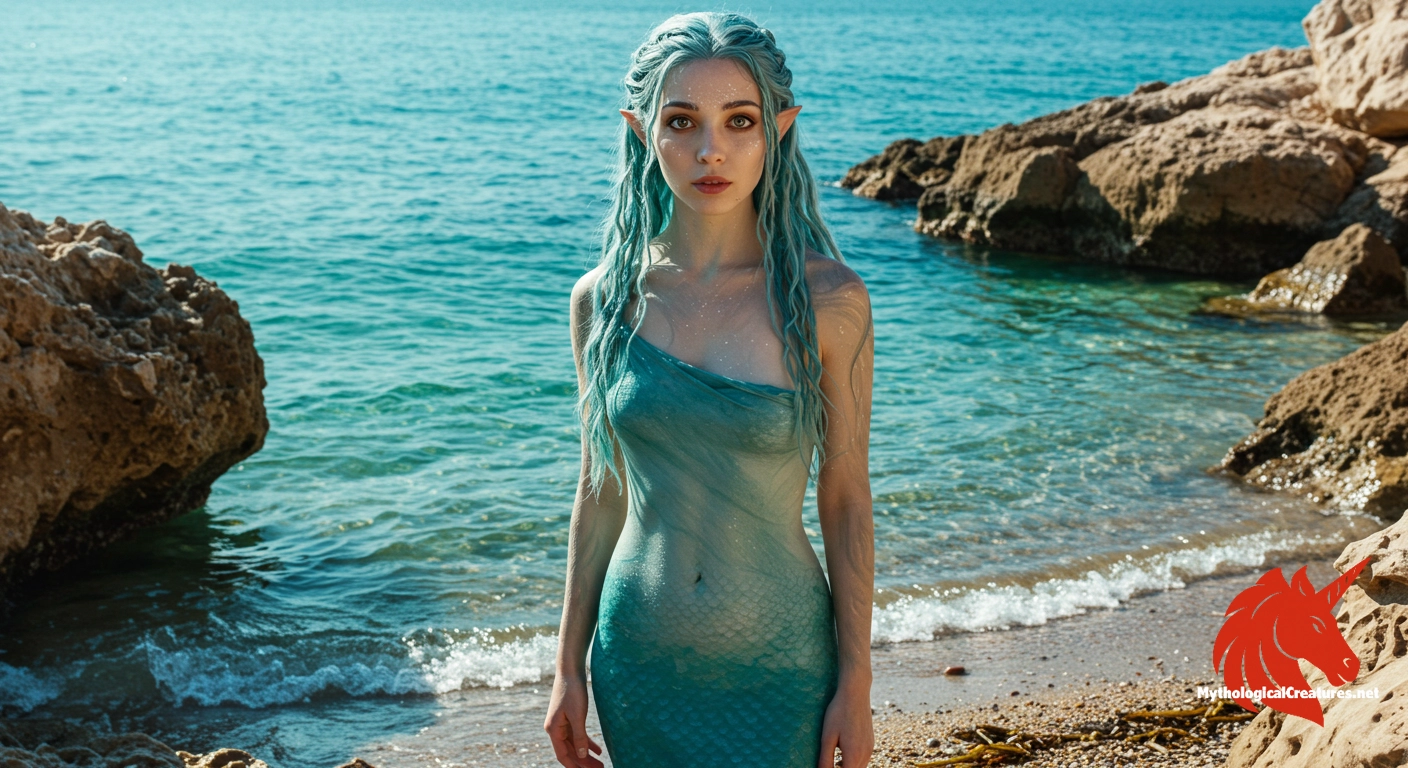Thetis: Thetis is a revered sea goddess and Nereid from Greek mythology, known for her control over water and significant mythological impact.

Thetis
Thetis - A vital figure in early Greek religion, Thetis is celebrated for her divine association with water, her leadership of the Nereids, and her crucial role in the lineage of heroes through her son Achilles.
Origins & First Encounters
Thetis emerges from the mists of ancient myth as a captivating water deity whose origins are interwoven with the primordial whispers of the sea. Born as one of the fifty Nereids, her lineage ties her to the ancient oceanic gods, positioning her among the earliest divine figures to be revered in Greek lore. Her dual nature blends the nurturing qualities of a sea nymph with the enigmatic force of a cosmic creator, an identity that has intrigued devotees and storytellers alike. With roots that possibly spiral back to pre-literate traditions, Thetis exists at the confluence of ritualistic worship and mythic storytelling. Her narrative is enlivened by episodes from the Trojan War cycle, where her marriage to Peleus sets in motion heroic destinies and tragic fates. The delicate balance between her divine attributes and her human-like interactions, particularly through her role as Achilles’ mother, highlights a rich tapestry of myth and memory. In a cultural context that prized both the mystery of nature and the complexities of fate, Thetis has served as an enduring symbol of both beauty and power. Her legacy reflects the evolution of ancient belief systems and continues to resonate as a tribute to the timeless allure of the sea.
Source Texts & Tale Variants
The earliest attestations of Thetis come from fragmented poetic hymns and sparse inscriptions that reveal an almost elemental reverence for her character. An elusive fragment by Alcman is among the few written records that casts her as a creator of cosmic order, hinting at narratives that have long since been lost to time. Oral traditions preserved her lore, allowing her story to flow through generations before it was committed to writing. Various sources touch upon her lineage as the daughter of Nereus and Doris, while some even suggest an affiliation with other divine figures, enriching her myth with layers of interpretative depth. Alternate versions of her story sometimes conflate her identity with that of Metis, thereby highlighting the fluidity of divine roles within Greek myth. Tales of her participation in the greater tapestry of the Trojan War cycle underscore her importance within epic narratives, lending both personal and cosmic dimensions to her character. Later historical writers, including Pausanias, provide hints that her cultic worship endured in select regions, preserving an aura of mystery about her true nature. Each surviving fragment and narrative variant contributes to a multifaceted image of Thetis, bridging ancient ritual with the immortal realm of myth.
Form & Powers
Thetis is artistically rendered as a figure of transcendent beauty, often capturing the shimmering essence of a silvery sea within her form. Her visage is portrayed with an ethereal quality, where luminous skin reflects the gentle play of light on water, inviting those who behold it into a world where the divine meets the natural. Graceful and lithe, her figure combines both strength and delicacy, embodying the unpredictable yet nurturing character of the ocean. Classical depictions frequently bestow upon her features that are both exquisitely human and unmistakably otherworldly, such as almond-shaped eyes that glisten with the mystery of deep waters. Her long, flowing hair is visualised as cascading waves, intermingling with aquatic motifs that celebrate her elemental origins. Some artistic traditions even hint at subtle shimmering effects—like the iridescence of pearls or faint scales—evoking the magic of the marine environment. The balance of soft, fluid lines with robust, dynamic gestures in her portrayals captures the inherent duality of nature itself. These variations in her physical depiction underscore her timeless allure, ensuring that her image remains as mutable and expansive as the sea she inhabits.
Regional Faces
Regional interpretations of Thetis enrich her myth by adapting her persona to local landscapes and cultural practices. In coastal cities where the ocean's bounty is celebrated, she is venerated as the supreme sea nymph whose benevolent power ensures safe voyages and abundant harvests of marine life. Inland communities have sometimes reimagined her as a more terrestrial spirit, blending her watery origins with symbols of fertility and rejuvenation inherent in nature. Artisans across various regions have contributed stylistic nuances to her imagery, often incorporating the distinctive hues and patterns of local waters into her representations. In some areas, rituals dedicated to Thetis were closely linked to sacred springs and coastal grottoes, serving as a reminder of her life-sustaining influence. Local legends often amplify her role as a protector, imbuing her with traits that resonate with the unique environmental and social contexts of each community. These adaptive portrayals highlight the fluidity of myth and its capacity to mirror the heartbeat of regional identity. Such diversity in her depiction reinforces Thetis’s status as a dynamic symbol, seamlessly merging local tradition with the expansive narrative of Greek mythology.
Cultural Parallels
Thetis occupies a unique niche in myth, harmonising the roles of divine nurturer and cosmic originator, and her persona invites comparisons with other water deities across world cultures. Within the Greek pantheon, she is inherently linked to her fellow Nereids, yet her portrayal is distinct in its profound connection to both creation and heroic destiny. Similar figures appear in other mythologies, where water spirits are endowed with the dual capacity to both bestow life and unleash its elemental fury. Parallels can be drawn between Thetis and the enchanting water nymphs of Celtic lore, whose ethereal beauty and fluctuating nature symbolise the mysteries of the natural world. Her multifaceted character also resonates with aspects of the Slavic Rusalki, where earthly allure meets the capricious power of water. Such analogies highlight a shared human fascination with the ocean's dual nature—both a nurturing provider and a potent force of transformation. Through these cross-cultural comparisons, Thetis stands as an emblem of the universal symbolism associated with water and its regenerative as well as destructive forces. Her myth, much like the narratives of other water deities, encapsulates the timeless interplay between the tangible and spiritual realms. This comparative legacy enriches her narrative, ensuring her relevance across diverse mythological traditions and cultural contexts.
Legacy & Modern Evolution
The enduring myth of Thetis has evolved through the ages, mirroring shifts in artistic expression and societal values while maintaining her connection to the elemental forces of water. In ancient Greece, she was revered not only as a sea nymph but also as a cosmic figure whose influence spanned both the natural and divine realms. The celebrated union with Peleus and the ensuing birth of Achilles established her as a pivotal figure in heroic narratives, intertwining her legacy with themes of fate and eternal struggle. As classical traditions gave way to Renaissance explorations of antiquity, Thetis was rediscovered as a symbol of both sublime beauty and the unfathomable power of nature. Her image has since been reinterpreted in modern literature, art, and even film, where she continues to encapsulate the mystique and complexity of water. Contemporary portrayals often emphasise her role as a bridge between the mortal and divine, inviting audiences to explore themes of transformation and destiny. This enduring evolution—infusing ancient motifs with modern sensibilities—ensures that her myth remains both timeless and continually relevant. The transformative journey of her character, from early cultic traditions to the vibrant realms of modern media, exemplifies the enduring power of myth to adapt and inspire across generations and cultures.
Interesting Fact
An intriguing aspect of Thetis is her dual legacy as both a nurturer of the sea and a primal force in cosmic creation, reflecting the complex interplay of divine power and maternal care in ancient Greek belief.
Reach myth fans
Connect your myth-driven brand with this audience
Our readers are writers, educators, gamers, and collectors who care about mythology. Enquire about a limited sponsor placement on creature pages.
Enquire about sponsorshipQuick Creature Info
Origin:
Associations:
Our Mythic Legendary Rating:

Habitat:
Supernatural Powers:
Physical Attributes:
Abilities:
Behavior:
Lore:
Related Creatures, Tales or Lore
- AAmphitrite
- LLeucothea
- GGalatea
References
Discover Another Mythical Legend You May Not Have Heard Of?
Uncover the mysteries of ancient folklore and expand your knowledge of legendary beings from cultures around the world.
Dare to Meet the Pisatao....
Curated by the Mythological Creatures Team
Series editor: Mythological Creatures Directory
Primary desk: Hellenic & Ancient Mediterranean Desk
(rev. November 2025)
